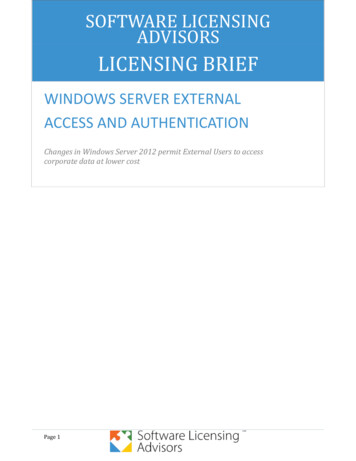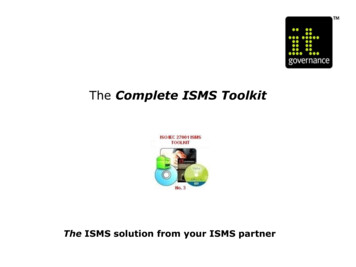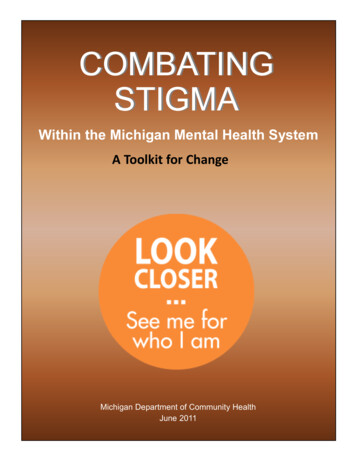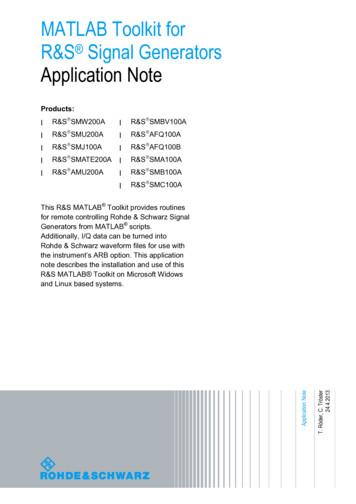
Transcription
Open Licensing Toolkitfor StaffThe Hewlett Foundation Open Licensing Toolkit for Staff is licensedunder a Creative Commons Attribution 4.0 International License.May 2015Legal Disclaimer: This material is for general informational purposes only and does not represent legaladvice as to any particular set of facts; nor does it represent any undertaking to keep recipients advised ofany relevant legal developments. Please consult appropriate professional advisors as you deem necessary.The Hewlett Foundation shall not be held responsible for any claims or losses that may arise from anyerrors or omissions in this document.
Hewlett Foundation Open Licensing Toolkit for StaffTable of Contents1. Hewlett Foundation Commitment to Open Licensing2. Hewlett Foundation Proceduresa. Frequently Asked Questionsb. Decision Treec. Creative Commons License Typesd. Guidelines for Marking Openly Licensed Documents3. Sample Languagea. Grantee Communicationsb. Grant Proposal Templatec. Grant Reporting Requirementsd. Grant Agreement Lettere. Direct Charitable Activities (DCA) ContractMay 2015
Hewlett Foundation Open Licensing Toolkit for StaffHewlett Foundation Commitment to Open LicensingAs part of our commitment to openness and transparency, the Hewlett Foundation has long supportedopen licensing—an alternative for traditional copyright that allows and encourages sharing ofintellectual property. Open licenses, such as those developed by our longtime grantee CreativeCommons, protect authors’ rights while giving explicit permission to others to freely use, distribute, andbuild upon their work. The benefits of open licensing are clear: open licensing increases the chances thatgood ideas will get a hearing, that others will be able to do something with them, and ultimately thatthey will have their greatest impact.The Hewlett Foundation makes information related to our grantmaking available under an open licenseso that others may learn from our experience. Beginning in 2014, we have extended our commitment toopen licensing to include, under certain circumstances, materials created with our grant dollars in orderto help ensure that our grantees’ work will reach the widest possible audience. The Hewlett Foundationgenerally requires grantees that receive project-based grants—those made for a specific purpose— toopenly license final materials created with those grant dollars, such as white papers, reports, and videos,under the current version of the Creative Commons Attribution license. This requirement does not applyto grants made for general operating support of an organization or a program of a nonprofitorganization (a research center at a university, for example). We believe that such a requirement isincompatible with the nature of general operating support grants, though of course we hope that thepositive experience of openly licensing works made with project-based grants will encourage ourgrantees to apply open licenses to all of their work.The Attribution license is the most open license offered by Creative Commons. It gives otherspermission, free of charge and in advance, to acquire and make available works licensed under it, as wellas to incorporate them into new ones—to “remix, transform and build upon” the work, in CreativeCommons’ phrase—even to sell the work, so long as they credit the original author for his or hercontribution.When our default open license does not make sense for a particular project-based grant—when thework in question contains sensitive information, or when revenue generated by its sale is critical to anorganization’s financial well-being, for example—we work with the grantee to determine the mostappropriate licensing. As with all of our efforts related to openness and transparency, we try toapproach open licensing with thoughtfulness and care; no grantee should suffer harm because of ourcommitment to open licensing.Open licensing, of the Hewlett Foundation’s own work and work created with our grant dollars, gives usa better chan
consult with Legal about the best open licensing option. - If no, stop. Make note in the Toolbox and inform your grants officer that the grantee will not create a work product in connection with this grant. 3) Is open licensing appropriate for the grantee work product? - Consider whether open licensing is appropriate for the work product.










